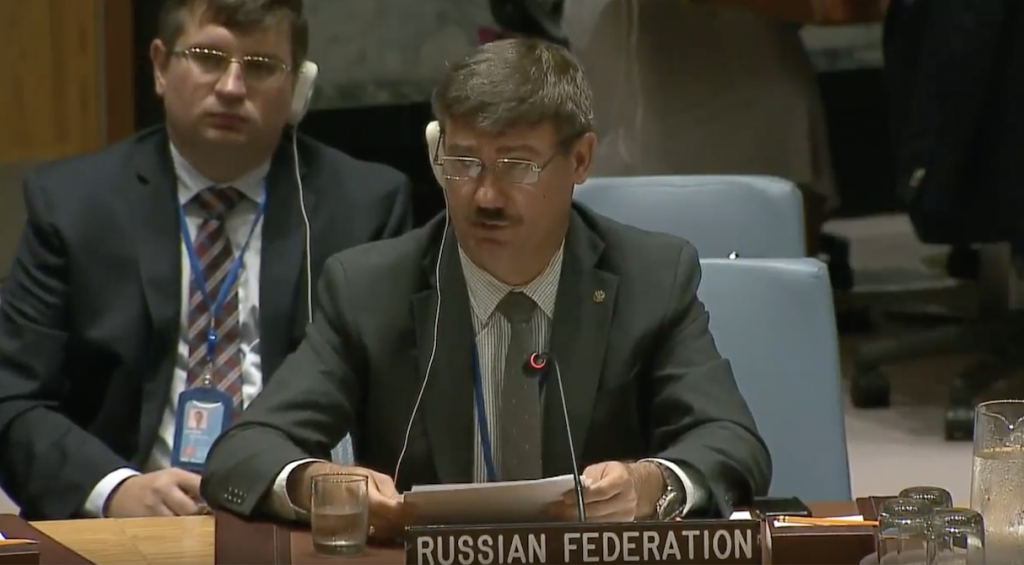Statement by Mr. Petr Iliichev, Chargé d'Affaires, at the Security Council on peace and security in Africa
We thank you, Mr. President, for having convened today’s timely meeting. We also thank Secretary-General António Guterres and the Commissioner for Peace and Security of the African Union, Mr. Smail Chergui, for their detailed briefings.
We welcome the efforts of our African partners in the resolution of conflicts on the continent. We note the marked intensification of the African Union’s activities and that of subregional organizations in this area, including through the establishment of a Peace and Security Architecture for the continent. We must also note the African Union’s ambitious plan to put an end to armed conflicts on the continent by 2020.
We are confident that, in order to effectively overcome crisis situations in Africa, we need an approach that, first and foremost, brings together Africans, gives them the leading role in defining the path to the settlement of conflicts on their continent and ensures effective support for those efforts by the international community. We support an approach that seeks African solutions to African problems.
We advocate close cooperation among the United Nations, African organizations and individual States with the aim of developing a coordinated approach to dealing with conflict situations in Africa on the basis of the Charter of the United Nations, the relevant Security Council and General Assembly resolutions and while observing the basic principles of peacekeeping.
At the same time, Russia’s principled position is that any settlement should be carried out using political methods, based on national dialogue and the settlement of the root causes of conflicts.
We understand the concerns of our African partners about the provision of adequate resources for African peacekeeping operations. We must increase the predictability, reliability and flexibility of the financing for African operations and joint missions. In principle, we do not object to considering the possibility of expanding United Nations participation in such missions, and we are ready to engage in constructive dialogue in that regard. At the same time, we believe that, regardless of the option we choose, it is extremely important that we maintain the current United Nations system of reviewing and approving the corresponding budgetary requests, ensure transparency and accountability in the allocation and use of funds, and provide for the participation of United Nations personnel in all stages of the planning and implementation of the designated tasks.
We believe that one of the reasons for the growing instability on the African continent is the attempts to engage in political engineering in a number of States in the Middle East and North Africa.
We regret that the accumulated experiences of the African Union in Libya and Côte d’Ivoire are simply being ignored. Inter-State relations have been unequal and disrespectful, based on ideological dogmas, and international law has been ignored, which have resulted in clumsy interference in the internal affairs of Africans and in the deterioration of State structures, the formation of new sources of instability, and the outbreak of terrorist groups, including the Islamic State in Iraq and the Levant (ISIL).
ISIL’s positions in Libya have been strengthened and militants have penetrated further to the south in Mali, the Niger and Chad, thereby creating a springboard for the creation of new terrorist threats in the Sahelo-Saharan region. There has been a clear trend of cooperation between ISIL and local terrorist groups, such as Boko Haram and Al-Qaida in the Islamic Maghreb.
The increasing cooperation of ISIL with Boko Haram is of particular concern. In the border areas of the Group of Five for the Sahel countries, we have seen the Al Mourabitoun group increase its activity with a view to bringing together all the Islamic structures in Mali, the Niger and Mauritania. In Somalia, under the banner of Al-Qaida, the activities of the terrorist group Al-Shabaab have noticeably increased.
Terrorists obtain material support through the criminal organizations they control, which traffic in drugs and weapons, organize channels of illegal immigration and take hostages. An essential source of income for terrorists remains the illegal trade in oil and oil products. We have also seen a strengthening in the cross-border link between terrorists and criminals, which is essentially a regional system of regeneration, capacity-building, funding and ideological influence in the sphere of international terrorism.
Russia has consistently advocated the pooling of international efforts, which would allow us to develop concerted approaches to countering the terrorist threat on the African continent with an emphasis on assisting countries in the region in strengthening their anti-terrorist efforts.
We support United Nations initiatives aimed at creating more favourable conditions for the provision of specialized technical assistance and capacity-building for African countries. We are ready to share with our African partners our counter-terrorism experience and to implement projects to increase the potential of African countries in their struggle against terrorism and extremism.
With regard to the activities of terrorist organizations in the region, Russian universities are working to train African law enforcement personnel and peacekeepers. Every year, the educational institutions of the Russian Ministry of the Interior train up to 80 peacekeepers and approximately 150 African police officers through higher education programmes, as well as approximately 300 individuals through short-term professional development courses.
We regret the most recent attempt of the delegation of Ukraine to draw the Security Council’s attention away from the issue we are currently discussing.
